Hyundai i30 vs Hyundai Tucson – Differences & prices compared
Compare performance, boot space, consumption and price in one view.
Find out now: which car is the better choice for you – Hyundai i30 or Hyundai Tucson?
The Hyundai i30 (Hatchback) comes with a Petrol or Petrol MHEV engine and Manuel or Automatic transmission. In comparison, the Hyundai Tucson (SUV) features a Diesel MHEV, Petrol MHEV, Petrol, Full Hybrid or Plugin Hybrid engine with Automatic or Manuel transmission.
When it comes to boot capacity, the Hyundai i30 offers 395 L, while the Hyundai Tucson provides 620 L – depending on how much space you need. If you’re looking for more power, decide whether the 140 HP of the Hyundai i30 or the 252 HP of the Hyundai Tucson suits your needs better.
In terms of consumption, the values are 5.70 L per 100 km for the Hyundai i30, and 1 L for the Hyundai Tucson.
Price-wise, the Hyundai i30 starts at 24000 £, while the Hyundai Tucson is available from 30600 £. Compare all the details and find out which model fits your lifestyle best!
Hyundai i30
The Hyundai i30 stands out in the hatchback segment with its sleek design and modern features. It offers a comfortable ride with a well-crafted interior that caters to both driver and passengers. With its emphasis on safety and technology, the i30 provides a balanced driving experience suitable for urban and suburban environments.
details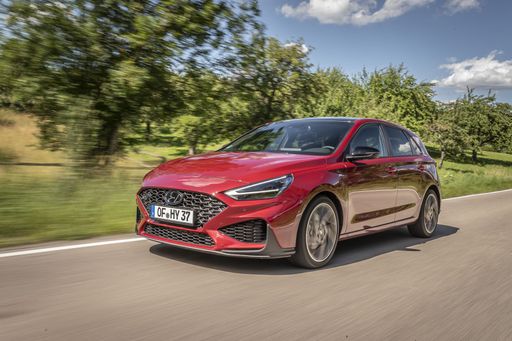 @ hyundai.news
@ hyundai.news
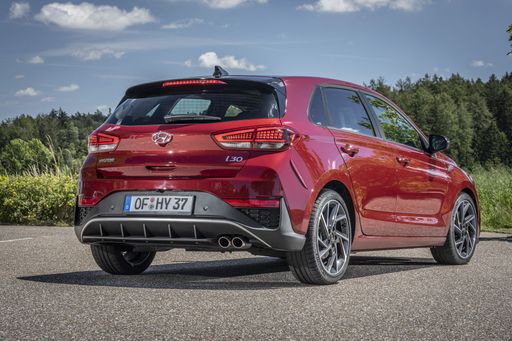 @ hyundai.news
@ hyundai.news
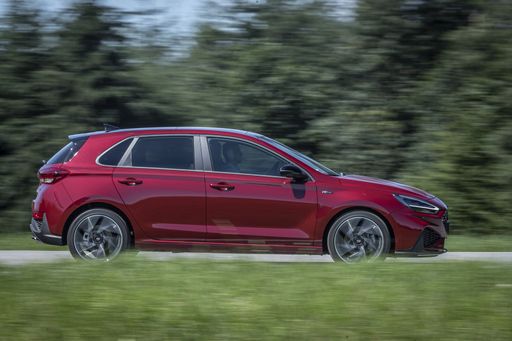 @ hyundai.news
@ hyundai.news
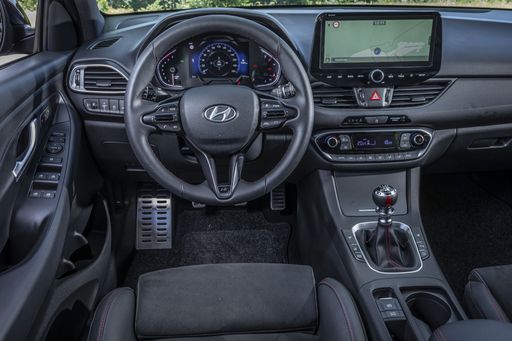 @ hyundai.news
@ hyundai.news
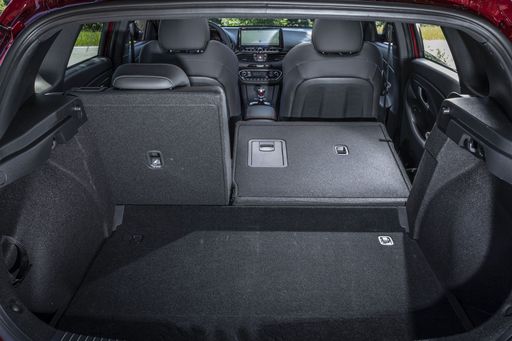 @ hyundai.news
@ hyundai.news
Hyundai Tucson
The Hyundai Tucson is a standout choice in the compact SUV segment, offering a perfect blend of style, comfort, and practicality. Its modern design is complemented by a spacious interior that provides ample room for passengers and luggage alike. With advanced technology and safety features, the Tucson ensures a smooth and enjoyable driving experience.
details @ hyundai.news
@ hyundai.news
 @ hyundai.news
@ hyundai.news
 @ hyundai.news
@ hyundai.news
 @ hyundai.news
@ hyundai.news
 @ hyundai.news
@ hyundai.news

|

|
|
|
|
Costs and Consumption |
|
|---|---|
|
Price
24000 - 29300 £
|
Price
30600 - 46300 £
|
|
Consumption L/100km
5.7 - 6 L
|
Consumption L/100km
1 - 6.9 L
|
|
Consumption kWh/100km
-
|
Consumption kWh/100km
-
|
|
Electric Range
-
|
Electric Range
64 - 70 km
|
|
Battery Capacity
-
|
Battery Capacity
-
|
|
co2
130 - 136 g/km
|
co2
22 - 156 g/km
|
|
Fuel tank capacity
50 L
|
Fuel tank capacity
42 - 54 L
|
Dimensions and Body |
|
|---|---|
|
Body Type
Hatchback
|
Body Type
SUV
|
|
Seats
5
|
Seats
5
|
|
Doors
5
|
Doors
5
|
|
Curb weight
1291 - 1407 kg
|
Curb weight
1520 - 1889 kg
|
|
Trunk capacity
395 L
|
Trunk capacity
546 - 620 L
|
|
Length
4340 mm
|
Length
4510 - 4520 mm
|
|
Width
1795 mm
|
Width
1865 mm
|
|
Height
1455 mm
|
Height
1650 mm
|
|
Payload
463 - 509 kg
|
Payload
525 - 545 kg
|
Engine and Performance |
|
|---|---|
|
Engine Type
Petrol, Petrol MHEV
|
Engine Type
Diesel MHEV, Petrol MHEV, Petrol, Full Hybrid, Plugin Hybrid
|
|
Transmission
Manuel, Automatic
|
Transmission
Automatic, Manuel
|
|
Transmission Detail
Manual Gearbox, Dual-Clutch Automatic
|
Transmission Detail
Dual-Clutch Automatic, Manual Gearbox, Automatic Gearbox
|
|
Drive Type
Front-Wheel Drive
|
Drive Type
Front-Wheel Drive, All-Wheel Drive
|
|
Power HP
100 - 140 HP
|
Power HP
136 - 252 HP
|
|
Acceleration 0-100km/h
9.6 - 13.1 s
|
Acceleration 0-100km/h
7.9 - 11.6 s
|
|
Max Speed
178 - 197 km/h
|
Max Speed
180 - 194 km/h
|
|
Torque
172 - 253 Nm
|
Torque
265 - 367 Nm
|
|
Number of Cylinders
3 - 4
|
Number of Cylinders
4
|
|
Power kW
74 - 103 kW
|
Power kW
100 - 185 kW
|
|
Engine capacity
998 - 1482 cm3
|
Engine capacity
1598 cm3
|
General |
|
|---|---|
|
Model Year
2024
|
Model Year
2024
|
|
CO2 Efficiency Class
D, E
|
CO2 Efficiency Class
E, F, D, B
|
|
Brand
Hyundai
|
Brand
Hyundai
|
Hyundai i30
Introducing the Hyundai i30: A Blend of Performance and Innovation
The Hyundai i30 continues to impress the automotive world with its fine balance of performance, efficiency, and cutting-edge technology. As a quintessential hatchback, the i30 caters to a diverse range of drivers, offering a remarkable driving experience through its impressive powertrains and compact yet stylish design.
Dynamic Performance Options
At the heart of the Hyundai i30 lies a variety of engine choices designed to suit different driving preferences. The power output ranges from 100 PS to 280 PS, allowing drivers to choose an i30 that perfectly matches their performance needs. Whether you're inclined towards the spirited drive of the N Performance variants or prefer the efficiency of the mild hybrid versions, there’s a powertrain tailored for you.
Innovative Hybrid Technology
For those seeking enhanced fuel efficiency without compromising on power, the i30’s 48V mild-hybrid system offers a compelling option. Available with both manual and automatic transmissions, this innovative technology provides an ideal balance, reducing emissions and improving fuel consumption, with an impressive average of just 5.7 L/100km.
Sophisticated Design and Features
The Hyundai i30’s sleek design is complemented by thoughtful interior features that elevate the driving experience. With a boot space ranging from 395 to 450 litres, this hatchback ensures ample room for all your luggage needs. Furthermore, the car's aesthetic appeal is matched by its practical ergonomic layout, catering to both style enthusiasts and those seeking functionality.
Advanced Safety and Technology
The i30 is equipped with an array of advanced safety features, enhancing driver confidence and ensuring passenger safety. Its cutting-edge safety suite includes lane-keeping assist, forward collision warning, and adaptive cruise control. Additionally, the i30 offers a modern infotainment system, designed to keep you connected and entertained on every journey.
Conclusion: A Versatile Choice for Modern Drivers
The Hyundai i30 is more than just a hatchback; it’s a remarkable amalgamation of power, efficiency, and modern technology. Whether you're enticed by the high-performance models or the eco-friendly mild-hybrid variants, the i30 stands out as a versatile choice that meets the demands of today’s discerning drivers.
Hyundai Tucson
Introducing the Hyundai Tucson: An SUV with Innovation at its Core
The Hyundai Tucson has long been synonymous with reliability, comfort, and exceptional value. With its 2024 model, this popular SUV has taken a bold leap forward by incorporating cutting-edge technology, efficient powertrains, and striking design. Let's delve into the technical details and innovations that make the Hyundai Tucson a standout in the crowded SUV market.
Dynamic Engine Options: Power Meets Efficiency
The Tucson offers a range of powertrains, ensuring there is a model perfect for every driver. Whether you're looking for the fuel efficiency of a mild-hybrid diesel or the power of a plug-in hybrid, the Tucson has you covered. The engine options include:
- Diesel Mild-Hybrid: Combining efficiency with robust performance.
- Benzin Mild-Hybrid: Offering a balance between economy and power.
- Voll-Hybrid: Delivering impressive power while maintaining low fuel consumption.
- Plug-in Hybrid: Offering electric-only driving capabilities with a range of up to 65 km.
These engines are paired with either a manual or automatic transmission, catering to different driving preferences.
Performance and Handling: Experience the Drive
The performance of the Hyundai Tucson is designed to impress, with power outputs ranging from 136 to 252 PS. The Tucson accelerates from 0-100 km/h in as little as 8.1 seconds, managed by precise transmission options such as the dual-clutch and traditional automatic gearboxes. With both front-wheel and all-wheel drive options, the Tucson assures stability and control in varied driving conditions.
Interior and Technology: Comfort Meets Cutting-Edge Innovation
The Tucson's interior is a haven of comfort and technology. With a length ranging up to 4520 mm and a spacious boot capacity of 620 litres, practicality is at the forefront. The intuitive infotainment system includes advanced connectivity features, while driver-assist technologies enhance safety and convenience on every journey.
The choice of luxurious trims and finishes, combined with ergonomic design, ensures that every drive is a pleasure, whether you're on a daily commute or an extended adventure.
Environmental Considerations: Efficiency and Sustainability
Hyundai has made notable strides in ensuring that the Tucson is as environmentally friendly as possible. Models with CO2 emissions as low as 27 g/km place it amongst the leaders in its class for eco-friendly driving. The array of hybrid options further complements Hyundai's commitment to sustainability, providing consumers with green alternatives without compromising performance.
Conclusion: The Hyundai Tucson Is More Than Just an SUV
The 2024 Hyundai Tucson is more than just a means of transport—it's a statement of modernity. It reflects Hyundai's dedication to innovation, efficiency, and comfort, all wrapped up in a stylish and versatile SUV. Whether you're tech-savvy, eco-conscious, or performance-oriented, the Tucson proves to be an ideal choice for forward-thinking drivers.
Which drive types are available for the Hyundai i30?
Available as Front-Wheel Drive.
The prices and data displayed are estimates based on German list prices and may vary by country. This information is not legally binding.
